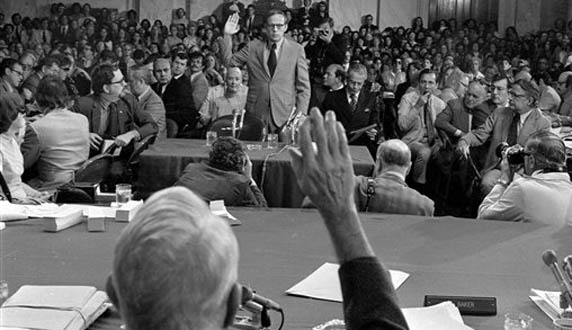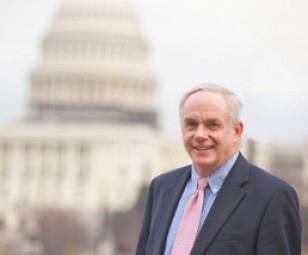
Hillary Clinton has not announced whether she will run for president in 2016, but Republicans are preparing to oppose her. Photo: AP
An Early Start on the 2016 Campaign
Democrats aren’t the only ones taking an early interest in a possible presidential run by former secretary of state Hillary Clinton. She is already popping up in a big way on Republican radar screens as well.
They’ve been watching the formation of the “Ready for Hillary” organization that hopes to have a grassroots network and funding mechanism in place if and when Clinton decides to run for president in 2016. This group includes some veterans of the Obama campaign efforts in 2008 and 2012, including some of the fundraisers who helped Democrats raise more money than the Republicans.
Republicans would love to take a page from the Obama campaign playbook and do some early work to discredit any potential Clinton candidacy and raise questions about her fitness as a candidate. Many Republican leaders believe the president benefitted during last year’s campaign when he was able to pound Mitt Romney with negative ads between the end of the primaries and the party conventions, when Romney did not have enough money to spend to mount a response.
By the time the general election campaign got underway in September, Romney was already damaged goods in the eyes of some voters because of the ads highlighting his involvement with Bain Capital. His comments secretly recorded at a Florida fundraiser about the infamous “47 percent” of Americans who depend on government and support the president compounded his image problem with voters.
Hillary Goes Hollywood
Now the Republicans are upping the ante by threatening to punish TV networks that have announced projects in the works about Hillary Clinton. NBC Entertainment is planning a mini-series on Clinton starring Diane Lane. CNN is going to produce a feature length documentary about her that will have an initial release in theaters.
Republican National Chairman Reince Priebus is threatening to bar NBC and CNN from hosting Republican candidate debates during the 2016 primary cycle if they go ahead with their projects. Priebus told MSNBC’s “Morning Joe” program that the threat is real because, in his words, “I cannot have companies in the business of making what I consider to be promotional movies about the life of Hillary Clinton,” then agree to host debates among Republican White House contenders.
Republicans love to slam the so called “mainstream media” because it stirs up grass roots conservatives who believe the main TV networks (except for Fox News) are sops for President Obama and the Democrats and outright hostile to conservative ideals.
The networks are not going to stop their Clinton projects because of this threat. It may play well with some conservative activists, but it also feeds a narrative that too often Republicans like talking to themselves in an echo chamber, but seem to do little to reach out to others beyond a narrow ideological spectrum.
Romney Warns on Shutdown
Yeah, that Mitt Romney. He told Republicans meeting in New Hampshire that it would be a mistake for congressional Republicans to force a shutdown of the federal government when the current funding bill expires at the end of September.

Former Republican presidential candidate Mitt Romney is warning his party against causing a government shutdown at the end of September. Photo: AP
A sizable conservative faction is trying to promote the idea of demanding that the president’s health care law, known to many as Obamacare, be defunded as part of any compromise to fund the government past October 1st. Romney thinks this is a bad idea. While he says he’d like to see Obamacare “go away”, he fears Republicans would get the blame for another government shutdown and would suffer in upcoming elections.
Now, you can bet the faction leading the charge to defund the health care law, people like Texas Senator Ted Cruz and Kentucky Senator Rand Paul, have little use for Romney’s advice. But the fact is a lot of the Republican establishment probably agrees with Romney even if some of them would be reluctant to say so publicly.
One of those in a tight spot on this issue is the Senate Republican leader, Mitch McConnell of Kentucky. McConnell faces a potentially tough primary challenge next year from a Tea Party inspired conservative candidate. And even if he survives that, he will face a Democratic candidate who is currently neck-and-neck with him in some early polls in Kentucky. So McConnell may be constrained in playing the same kind of lead compromise role he did on budget issues earlier this year with Vice President Joe Biden. The question is, which Republicans will be willing to step up and talk compromise just as the 2014 midterm election cycle is about to begin.
Christie Riding High
A recent Granite State public opinion poll found a surge of support for the New Jersey Governor Chris Christie among New Hampshire voters considering potential Republican presidential candidates in 2012. Christie led the field in the latest survey with 21 percent support, followed by Rand Paul at 16 percent, former Florida governor Jeb Bush at 10 percent, Wisconsin Representative Paul Ryan at 8 percent and Florida Senator Marco Rubio at 6 percent. Christie jumped up from only 11 percent in the same poll in April. Rubio meanwhile was at 15 percent in the April poll but dropped considerably in this latest survey.

New Jersey Governor Chris Christie would be a strong presidential candidate for the Republicans in 2016, polls show. Photo: AP
Christie is heavily favored to win a second term as New Jersey governor this November. The latest Quinnipiac poll has him leading his Democratic opponent by a margin of 58 to 30 percent, with 30 percent of Democrats saying they will vote for him. That should impress Republican Party elders looking for a candidate who can appeal outside of the party’s conservative base in a presidential election.
But it’s unlikely to impress many of Christie’ potential rivals for the Republican presidential nomination in 2016. Other likely candidates like Ted Cruz, Rand Paul and Marco Rubio are likely to question Christie’s commitment to conservative values, and we will probably see a bit of a re-run of the 2012 Republican primaries where a slew of candidates kept trying to outdo one another in trying to appeal to conservative voters.
Romney finally emerged from that fight as the winner despite complaints from some party activists that he wasn’t conservative enough. It remains to be seen whether Christie can follow a similar script or if he will be derailed by a Republican Party more interested in a true believer candidate than one who could have appeal to moderate and perhaps even Democratic voters.






























